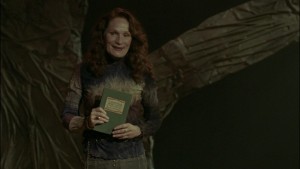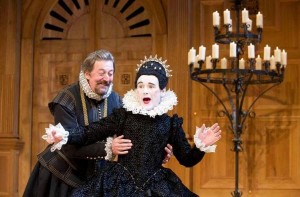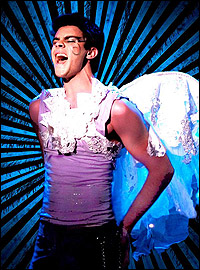
Cory James Krueckeberg and Tom Gustafson’s musical adaptation of Shakespearean classic A Midsummer Night’s Dream utilizes the literary magic of Shakespeare to incorporate pressing and important present day issues regarding homophobia and toleration. Were The World Mine addresses the tale of Timothy (Tanner Cohen), a persecuted gay student at an all-boys private school outside of Chicago, and his fantastical forays into a dream world of songs, dance, and lustful mayhem. An anthem for acceptance and toleration, Were the World Mine incorporates traditional Elizabethan play elements, text, and costumes in the present world of an all male, testosterone-driven play setting.
Right from the start of the film, the Elizabethan influences are evident in the song and dress. As Timothy and the other male students from the school rugby team are in their graduating year at prep school, they are all required to participate in the springtime play as chosen by the eccentric and bohemian English and Drama teacher Ms. Tebbit (Wendy Robie). Aware of the Elizabethan acting customs of the time, Ms. Tebbit chooses to put on an adaptation of Shakespeare’s A Midsummer Night’s Dream where some of the boys are cast in female roles. Providing a bit of context to the bewildered homophobic athletes, Ms Tebbit recants to the students the restrictions placed on women performing in the theater back in Elizabethan times and how male actors were required to portray women in the productions. Regardless of the gender identity of the roles, actors were required to flirt, woo, and romantically involve themselves with their fellow men.
where some of the boys are cast in female roles. Providing a bit of context to the bewildered homophobic athletes, Ms Tebbit recants to the students the restrictions placed on women performing in the theater back in Elizabethan times and how male actors were required to portray women in the productions. Regardless of the gender identity of the roles, actors were required to flirt, woo, and romantically involve themselves with their fellow men.
After auditioning and securing the role of Puck, Oberon’s trusted but mischievous faerie servant, Timothy discovers the recipe of the love potion within the pages of his script of A Midsummer Night’s Dream. Pulling together all of the ingredients, Timothy manages to create the famed love-in-idleness flower and frolics about the town turning student and adult alike into lust-thirsty lovers. Unlike the original lovers of Shakespeare’s A Midsummer Night’s Dream, most of the mismatched couples in the film are homosexual pairings and reveal the narrative twist the writers had upon the play. Jumping from boy to boy, house to house, curmudgeonly townsperson to homophobic neighbor, Timothy the modern-day Puck creates a scene of rampant lustfulness and debauchery in his quiet town. Through his actions, Timothy begins to unravel the homophobia and intolerance that the public has against homosexuals and queer persons.
Looking to Elizabethan London for historical context, homosexuals or even supposed-homosexuals were persecuted and homophobia was at an all time high. Prior to Shakespeare’s popularity in the London theater market, anti-buggery and sodomy laws were passed and in effect prohibiting sexual relations between members of the same sex.  The law of London, like the laws of the present day United States, did not explicitly condemn homosexuals, but vilified their practices and disgraced family names. Audiences of the theater, low and highborn alike, were well aware of the homosexual connotations that surrounded male professions in the theater and looked at professional theater work as reserved for the subservient and unskilled.
The law of London, like the laws of the present day United States, did not explicitly condemn homosexuals, but vilified their practices and disgraced family names. Audiences of the theater, low and highborn alike, were well aware of the homosexual connotations that surrounded male professions in the theater and looked at professional theater work as reserved for the subservient and unskilled.
In the conservative and homophobic town where most of the students and adults of the town belong to heteronormative relationships including rugby coach Coach Driskill (Christian Stolte), the school headmaster Dr. Lawrence Bellinger (David Darlow), the headmaster’s wife / cosmetics entrepreneur Nora Bellinger (Jill Larson), and Timothy’s hard-pressed single but loving mother Donna (Judy McLane), Were The World Mine reveals the struggles that queer men and women go through in search of love and acceptance. Each of these characters are squirted in the eyes with the magical love potion and fall into love with members of the same sex, culminating in a dramatic and moving final school performance of A Midsummer Night’s Dream where all of the students and adults alike are cleansed of their lustful feelings and return to their previous selves. Through their respective forays into homosexual lust and identity crisises, the persons involved slowly begin to recognize their homophobia and the toleration and acceptance needed as a community to not harm their LGBTQ+ members.
T his transformation from homophobia to acceptance, disgust to toleration is channeled through the music and songs. Using the original Midsummer Night’s Dream as an inspiration, writers and director Krueckeberg and Gustafson crafted the music and lyrics out of the Bard’s own mouth. Twisting and turning his words into song, the music adds to the fantastical and dreamlike quality of the film while preserving the artistic integrity of Shakespeare’s vision. This is what makes this adaptation of A Midsummer Night’s Dream so successful. The film’s ability to utilize the original text and reveal powerful connections to present issues in a new light is what I believe strikes favorable chords with the audience.
his transformation from homophobia to acceptance, disgust to toleration is channeled through the music and songs. Using the original Midsummer Night’s Dream as an inspiration, writers and director Krueckeberg and Gustafson crafted the music and lyrics out of the Bard’s own mouth. Twisting and turning his words into song, the music adds to the fantastical and dreamlike quality of the film while preserving the artistic integrity of Shakespeare’s vision. This is what makes this adaptation of A Midsummer Night’s Dream so successful. The film’s ability to utilize the original text and reveal powerful connections to present issues in a new light is what I believe strikes favorable chords with the audience.
In conclusion, here is an excerpt from one of the original songs from the film, Be As Thou Wast Wont. The language echoes Shakespeare but conveys an entirely different meaning in its staging and musical delivery:
We fairies that do run
From the presence of the sun
We follow darkness like a Dream.
